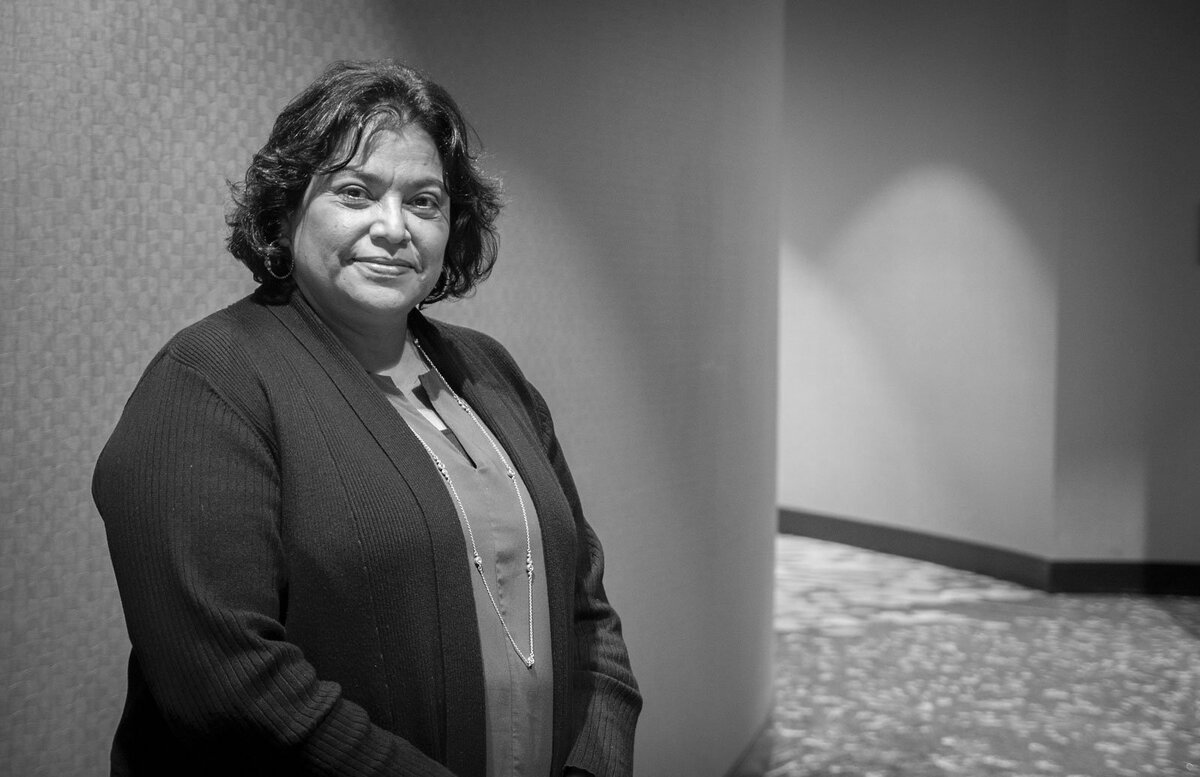Dr. Emma Iriarte, Salud Mesoamerica Initiative, speaks about a systemic approach to family planning, and about the RHSC’s “priceless brokering”
31st October 2016

The memory is 25 years old, but remains fresh in Dr. Emma Iriarte’s mind. The first thing she noticed was that the husband had accompanied his wife. Usually in the remote mountain villages of Honduras, women went alone to the doctor to ask about family planning. But this was different. This couple had five children at home. Desperate, they simply could not care for a sixth. They had run out of resources.
Dr. Iriarte, Executive Secretary of the Salud Mesoamerica Initiative (SMI) at the Inter-American Development Bank (IDB), was a young doctor in training 25 years ago. Newly-transferred to a mountain village in Honduras for her residency, she had already undergone seven years of medical training. But out of those seven years, only 45 minutes had been dedicated to the instruction on family planning.
“I remember reading the Ministry guidelines feverishly,” she says. “And I gave the woman three blister packs of oral contraceptives with instructions to return in three months.” Dr. Iriarte made the couple repeat her instructions until she was satisfied the woman knew what to do.
“I looked into this woman’s eyes and I knew I had let her down.”
Imagine her shock, therefore, when three months later, the couple returned asking for prenatal care. The woman was pregnant. Upon questioning, Dr. Iriarte found out that the husband and wife had shared the pills between them. In a month-and-a-half, they had finished the medication, and in the remaining month-and-a-half, they had had unprotected sex. Dutifully, after three months, they had come back to Dr. Iriarte.
“To this day, I remember how I felt at that moment,” Dr. Iriarte remembers. “I looked into this woman’s eyes and I knew I had let her down.” The incident made her resolve to make a difference in the way reproductive health is prioritized, not just in Honduras, but through Mesoamerica and wherever it is needed. Today, as the Executive Secretary of SMI, she oversees this private-public partnership between the Bill and Melinda Gates Foundation, the Carlos Slim Foundation and the Government of Spain, which aims to close the health equity coverage and quality gap for the poorest 20 percent of the population of eight countries in Mesoamerica.
She applies lessons she has learned from partners in the reproductive health community and particularly values the IDB’s relationship with the Reproductive Health Supplies Coalition. She has been on the Coalition’s Executive Committee for three years. The impact of her relationship with the Coalition is remarkable, she says, helping her support countries to incorporate family planning and contraceptive security into all related services in Belize, Honduras, Chiapas State in Mexico, Guatemala, El Salvador, Nicaragua, Costa Rica and Panama. “Along with the implementation of Salud Mesoamerica’s results-based financing model, the influence of the Coalition, and the networking it has enabled, has meant that in the last three-and-a-half years we have helped more than 1M additional women gain access to five modern contraceptive health methods in more than 1,000 health facilities,” she says. This includes training for nurses, physicians and community health workers in providing family planning services.
Changes in the last three years have been phenomenal: “We have supported the procurement of contraception and registration of new products such as implants for adolescent use in Costa Rica. In the eight countries, after 18 months of intervention, we have helped increase the permanent availability of five modern contraceptive methods.”
The ideas and the relationships the Coalition’s membership meetings provide are invaluable, Dr. Iriarte says. “Belize is facing stock-outs in contraceptive methods, I referred them to the Coalition’s different mechanisms that addressed this problem, such as CARHs. For information needs, I turn to the regional forum ForoLAC. When I was advocating for implant use in Costa Rica I recommended applying the lessons learned from the Implanon Access Initiative,” she says. (The Coalition and partners brought about substantial price reductions in implant unit prices under the Implanon Access Initiative.) And after this Seattle meeting, she is planning on sharing with stakeholders in El Salvador what she has learned from attending a session on introducing pregnancy tests to community health workers, in order to increase access to contraception. The issue is a high priority for her and for SMI. By supporting the government of El Salvador in using pregnancy tests, Salud Mesoamerica has helped increase the contraceptive prevalence rate from 53% to 75% in the last three years, in the hardest-to-reach communities.
Dr Iriarte’s vision for the future includes what she calls “the systemic approach” – not just focusing on contraceptive security and family planning but approaching these issues as part of a continuum of women’s services. “The same service providers deal with contraceptive counselling, prenatal care, birth assistance, postnatal care, gynaecological services… If we try to manage family planning as a vertical intervention it gives results, but they are not sustainable,” she believes. “In El Salvador, Honduras and Chiapas for example, we supported the Ministries of Health to develop a checklist; every time a woman comes to a health centre the provider gives her a five-question checklist and one question would always address family planning.”
Latin America has a stronger role to play in the Coalition, believes Dr. Iriarte. “I hope to see more representatives of government in the Executive Committee and at the General Membership Meeting -- we should be intentional about it,” she says. As for the Coalition’s membership meetings, she hopes they will continue annually; they are a vital networking opportunity for the community, she says, unlike any other meeting.
“I have many contacts,” she says, “but the brokering the Coalition provides? That is priceless.”